2025 ESG Summit & Green Transition Forum Held in Beijing: Empowering Economic Resilience, Charting New Paths for High-Quality Development
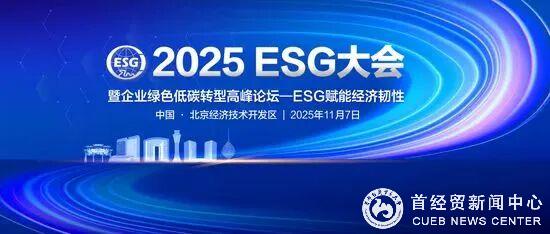
Recently, under the guidance of the China Association of Social Workers, the 2025 ESG Summit & Green Transition Forum, co-hosted by CUEB and the China Enterprise Management Science Foundation (CEMSF), was held in Beijing. Gathering at the conference, experts and executives from government departments, social organizations, universities, renowned enterprises, and financial institutions jointly explore frontier trends and practical paths for ESG empowering economic resilience to inject new momentum into high-quality economic and social development.
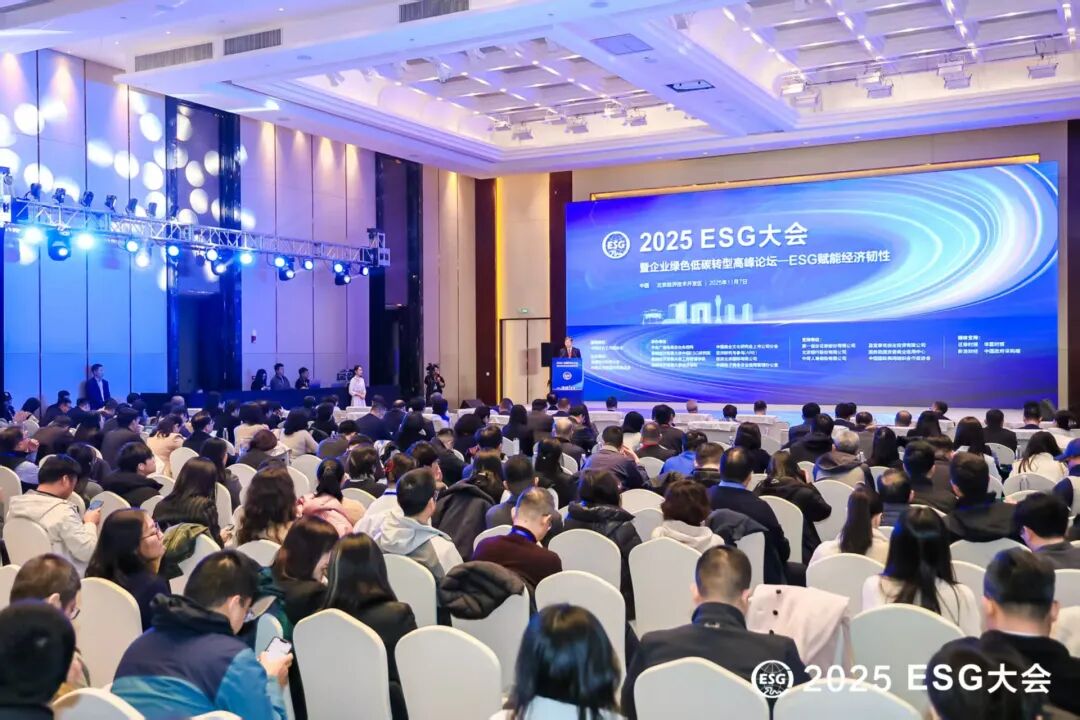
During the opening ceremony, Chen Cungen, President of the China Association of Social Workers; Shi Xianghui, Member of the Party Committee and Executive Deputy Secretary-General of the China Enterprise Confederation; Wang Wenju, Secretary of the Party Committee of CUEB; Lai Xianyu, Member of the Party Committee and Deputy Director of the Beijing Municipal Committee of Development and Reform; and Yi Yuanjia, Deputy Director of the Management Committee of the Beijing Economic-Technological Development Area addressed respectively. And Wu Weixing, Deputy Party Secretary and President of CUEB, presided over the ceremony.
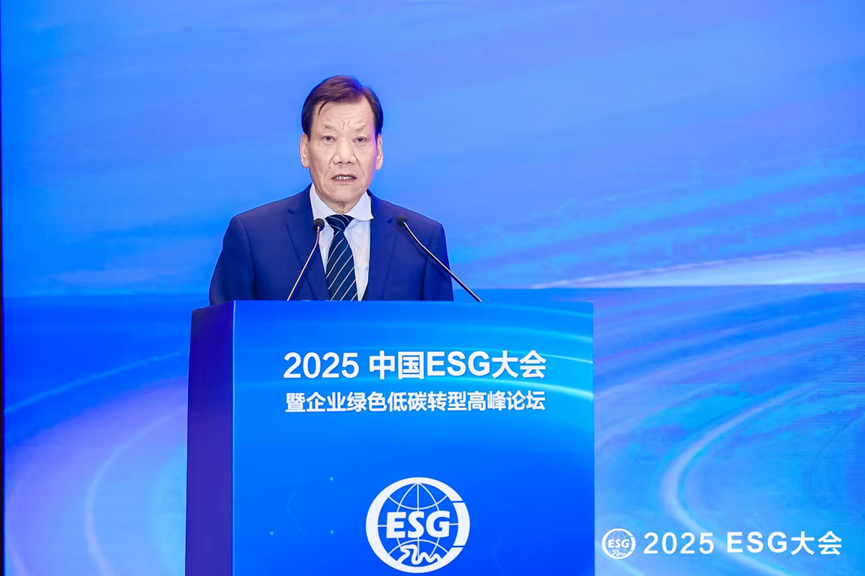
During the opening ceremony, Chen Cungen, President of the China Association of Social Workers; Shi Xianghui, Member of the Party Committee and Executive Deputy Secretary-General of the China Enterprise Confederation; Wang Wenju, Secretary of the Party Committee of CUEB; Lai Xianyu, Member of the Party Committee and Deputy Director of the Beijing Municipal Committee of Development and Reform; and Yi Yuanjia, Deputy Director of the Management Committee of the Beijing Economic-Technological Development Area addressed respectively. And Wu Weixing, Deputy Party Secretary and President of CUEB, presided over the ceremony.

Shi Xianghui emphasized that sustainable development was a unified goal achieved through consultations among 193 UN member states. At present, China has made significant progress on 17 Sustainable Development Goals (SDGs). Under the guidance of the new strategy, Chinese enterprises should develop resilient sustainable capabilities in terms of industrial structure, innovation drives, resource guarantee, ecological environment, economic security, and social harmony, thereby further enhancing global influence in the field of ESG.
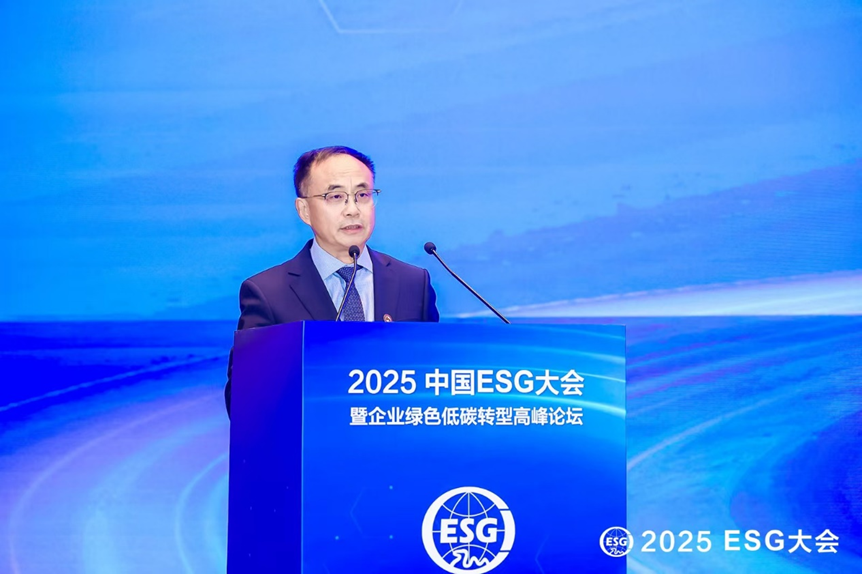
Wang Wenju stated that ESG was no longer just a set of corporate evaluation standards, but also a profound development philosophy and a core competitiveness in the future. It accurately responded to the challenges of our times and provided key conceptual guidance and practical frameworks for economic structural transformation as well as the resilience and sustainability of socio-economic development. Building an independent Chinese ESG knowledge system is crucial for China to strengthen international discourse power in the field of sustainable development.
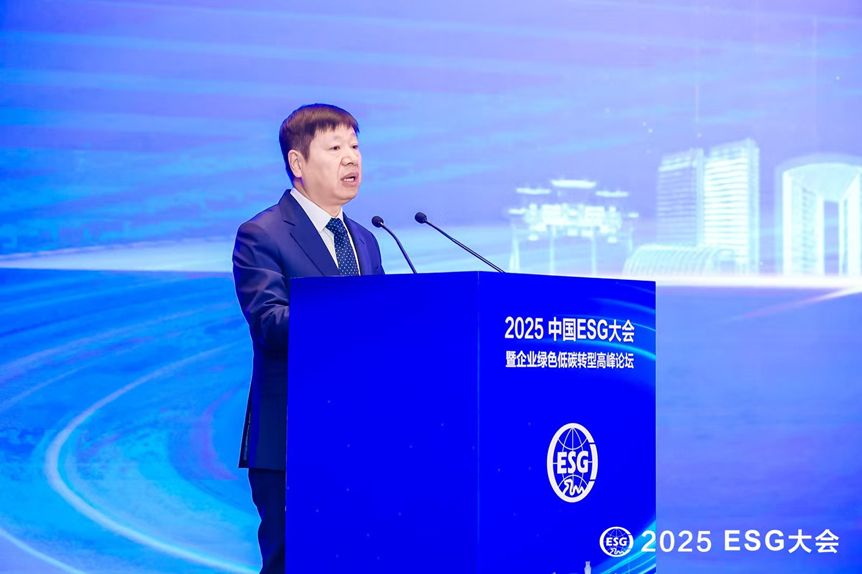
Lai Xianyu expressed that Beijing prioritized the construction of ESG framework as key initiatives to foster high-quality development in the new era. A series of initiatives have gotten positive outcomes. The city has basically formed a sound pattern for the high-quality development of the ESG system, which strongly underpins the development of an international benchmark city for the green economy. Beijing will enhance information disclosure, improve the ESG ecosystem, deepen ESG practices, and expand ESG applications in sectors like government procurement.
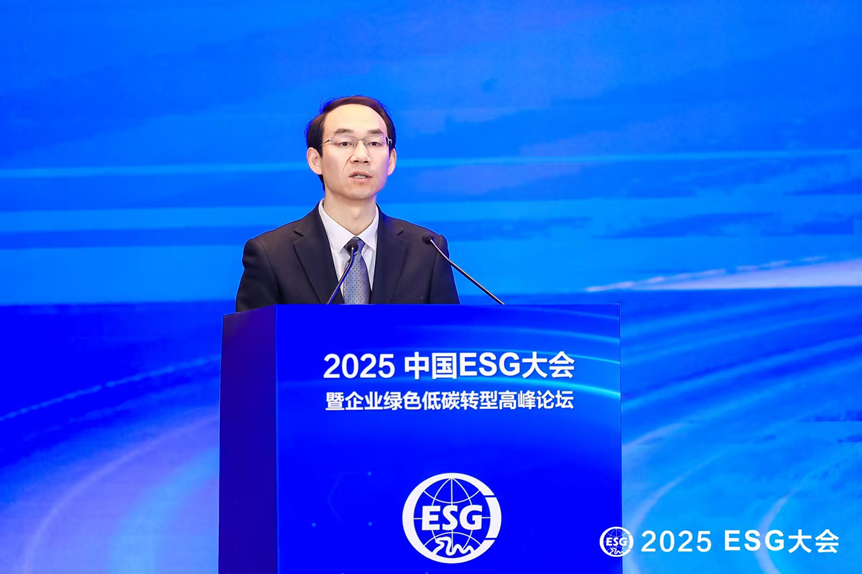
Yi Yuanjia said that Beijing E-Town always integrated green and low-carbon development into urban development, embedding ESG principles throughout industrial upgrading, urban governance, and open innovation. The district made numerous explorations to develop new productive forces and advance sustainable development. In 2025, Beijing E-Town has implemented five major actions for comprehensive green and low-carbon high-quality development, gaining significant achievements in strengthening green development through technological advancements, governance measures, low-carbon transportation, energy and carbon reduction, and benchmark management.”
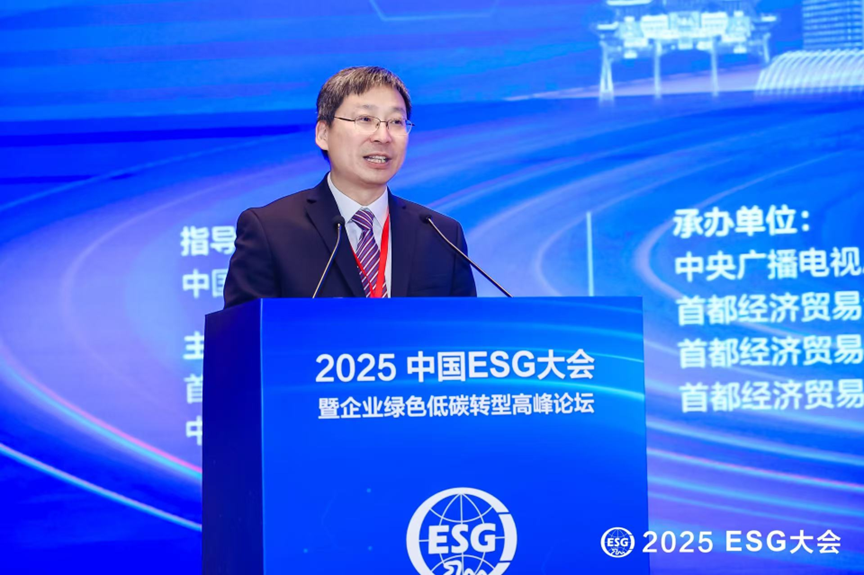
Wu Weixing stated that while presiding over the opening ceremony that as one of the hosts, CUEB always regarded serving national strategies and exploring cutting-edge knowledge as its mission. He noted that the theme of this forum, “ESG Empowering Economic Resilience,” accurately responded to the demands of the times. ESG, as a key framework guiding capital flows and shaping long-term corporate value, was playing an essential role in enhancing economic resilience and sustainability. He further emphasized that this forum was to pool strengths from government, industry, academia, research, and society to discuss frontier ESG trends, build China’s independent ESG knowledge system, and contribute wisdom and solutions to high-quality development of economy and society.
Subsequently, Cao Jianming, Vice Chairman of the Standing Committee of the 13th National People’s Congress, delivered a speech as a special guest.
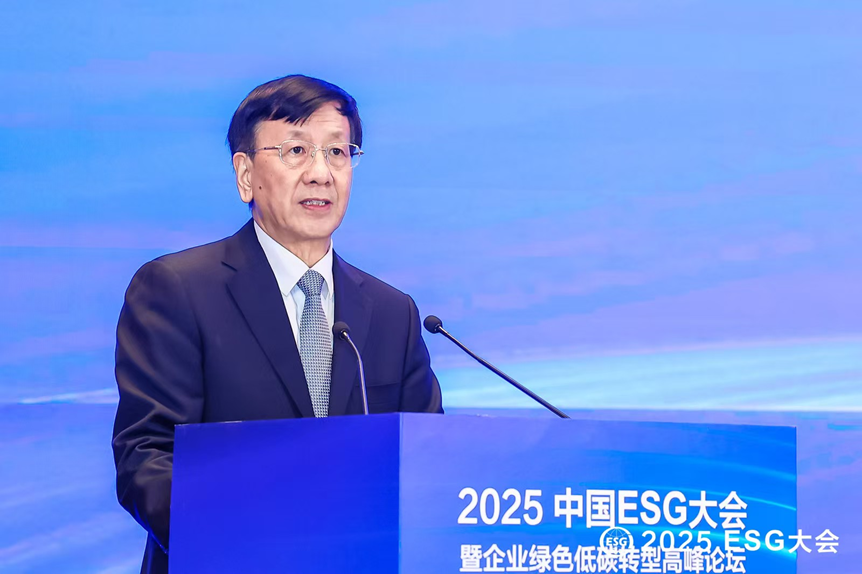
Cao Jianming expressed that the ESG concept has broken away from the past narrow focus on corporate financial performance and transcended the scope of corporate social responsibility, evolving into an institutional infrastructure for companies to reshape economic logic and enhance systemic resilience. Cao said, “China is always an important participant, contributor and leader in global ecological civilization construction. From the solemn commitment of the ‘dual carbon’ goals to the continuous advancement of the green ‘Belt and Road’ initiative, and the rapid construction of a new energy system, China is demonstrating the responsibility of a major country in concrete actions.” He called for a commitment to systematic thinking, strengthening technological empowerment, deepening global collaboration, and building a more inclusive, fair and sustainable global governance system.
Keynote Speech
The conference then proceeded to the keynote speech session. Addresses were delivered by Shang Fulin, former Director of the Economic Affairs Committee of the National Committee of the Chinese People’s Political Consultative Conference (CPPCC); Ling Wen, Academician of the Chinese Academy of Engineering; and Liu Zhaobin, former Chief Engineer of the General Administration of Quality Supervision, Inspection and Quarantine of China.
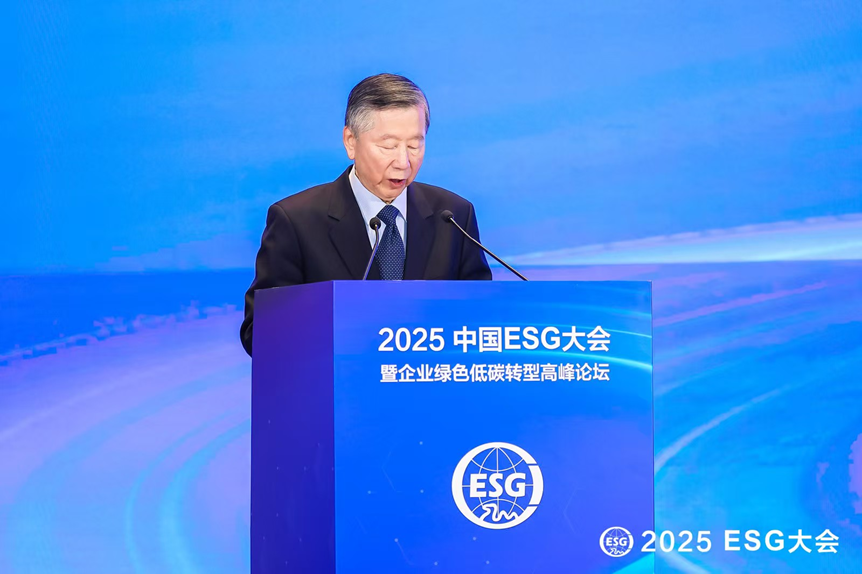
Shang Fulin remarked that ESG was not an “extra credit question,” but a “required answer sheet” for building China’s economic resilience, and a “distinctive practice” on the path of Chinese modernization. During the 15th Five-Year Plan period, the construction of the corporate in ESG will shoulder more responsibilities and missions. He called for a deeper exploration of ESG practice models with Chinese characteristics to inject more new momentum and advantages for development. Industries should take ESG as a guide to promote the transformation of the industrial structure towards greener, higher-end, and smarter development, thereby building a modern industrial system with more resilience.
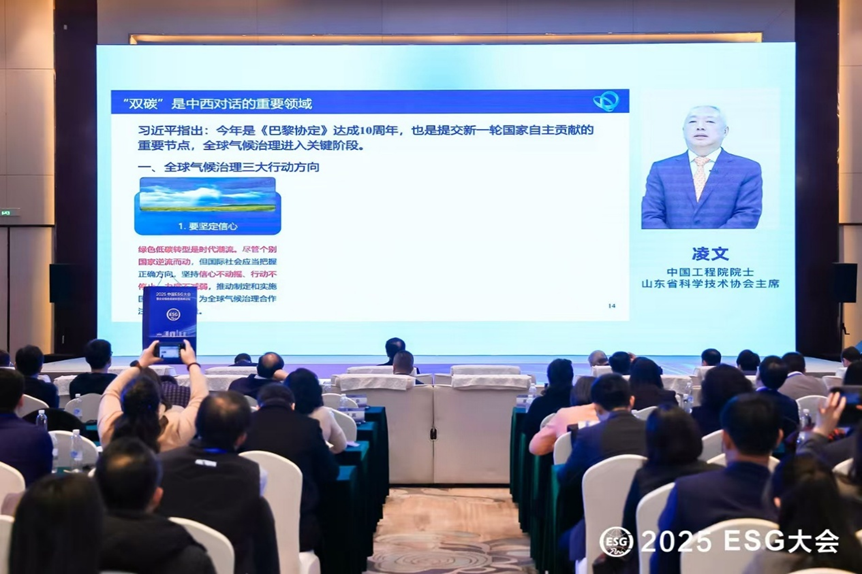
Ling Wen explained the 2035 Nationally Determined Contribution (NDC) target. He stated that the NDC target adopted a “1+3+3” core framework, which is formulated by China as its utmost effort in response to the Paris Agreement . “This target also makes ESG no longer just a disclosure tool, but a core competitiveness for enterprises to secure resources, orders, capital, and licenses in Chinese and even the global market. Whoever takes the lead in this field will gain an advantage in the new phase,” Ling Wen said.
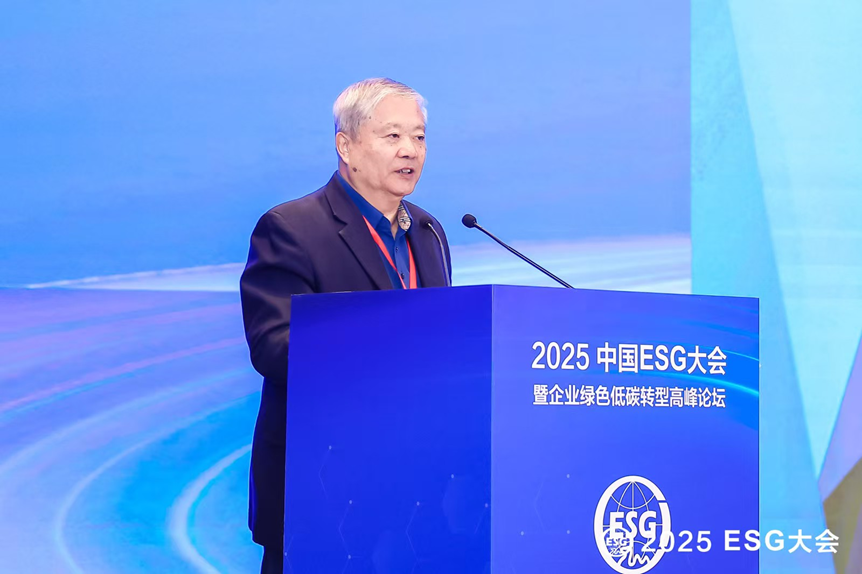
Liu Zhaobin focused on reflections on the costs and benefits of ESG. He emphasized that the biggest challenge in advancing ESG domestically and globally lies in balancing costs and benefits, namely the “Green Premium” proposed by Bill Gates. And the fundamental solution was innovation in many aspects, including product and category, equipment and facility, process and material, as well as management and business model. He also called for establishing a sound ESG green and low-carbon incentive mechanism, and formulating related policies and regulations as well as institutional arrangements in areas, such as finance, taxation, economics, import and export, financial accounting systems, tendering, government procurement, and business environment.
Thematic speech
Subsequently, multiple guests shared cutting-edge insights and practice, including Roman Novozhilov, ESG Head of the New Development Bank, Huo Xuewen, Party Committee Secretary and Chairman of Bank of Beijing; He Zhenwei, President of the China Industrial Overseas Development Association; Wang Lianfeng, General Manager of China State Construction Engineering Corporation (Yizhuang New City) Headquarters, Party Committee Secretary, Chairman, and General Manager of China State Construction Development Co., Ltd., and Dean of China Construction Dual Carbon Strategy Research Institute; and Shen Yu, Deputy General Manager of Beijing Energy Holding Co., Ltd.
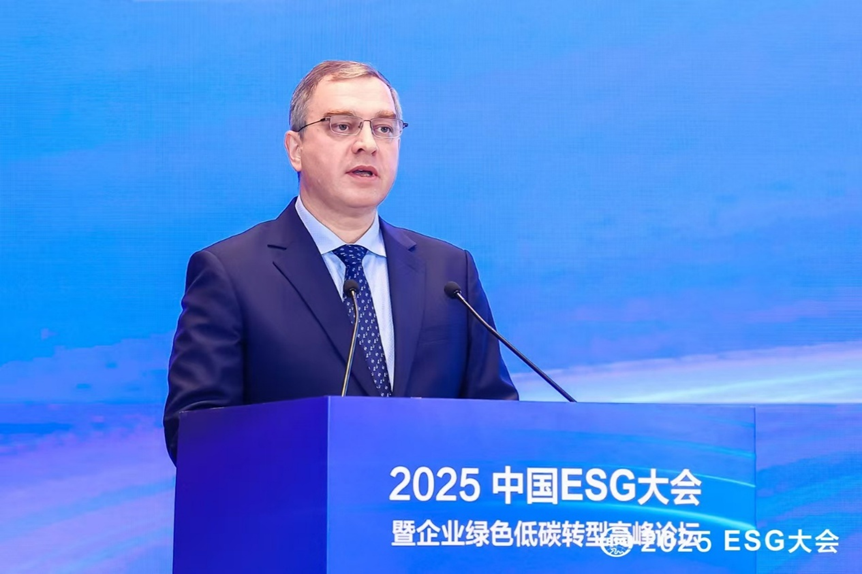
Roman Novozhilov believed that China played a leading role in establishing and improving the green financial ecosystem, capable of mobilizing resources efficiently and on a large-scale, thus setting an example for the world. High-quality ESG standards enhanced transparency, strengthened investors’ confidence in large-scale capital allocation, and ensured that economic growth was both sustainable and inclusive.
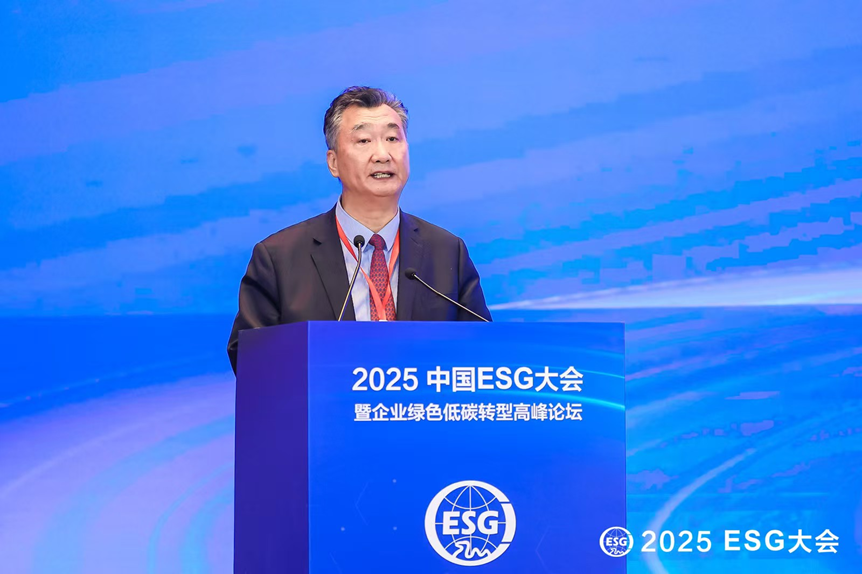
Huo Xuewen, drawing on the banking industry’s practices, stated that to developed green finance, the top-level design must first be solidified. It was crucial not only to clarify the “where to go” but also to ensure “steady progress.” He explained that Bank of Beijing was realizing unified action and coordinated advancement through a vertical management system featuring “headquarters coordination, branch implementation, and sub-branch outreach,” integrating the concept of green finance throughout the entire business process.
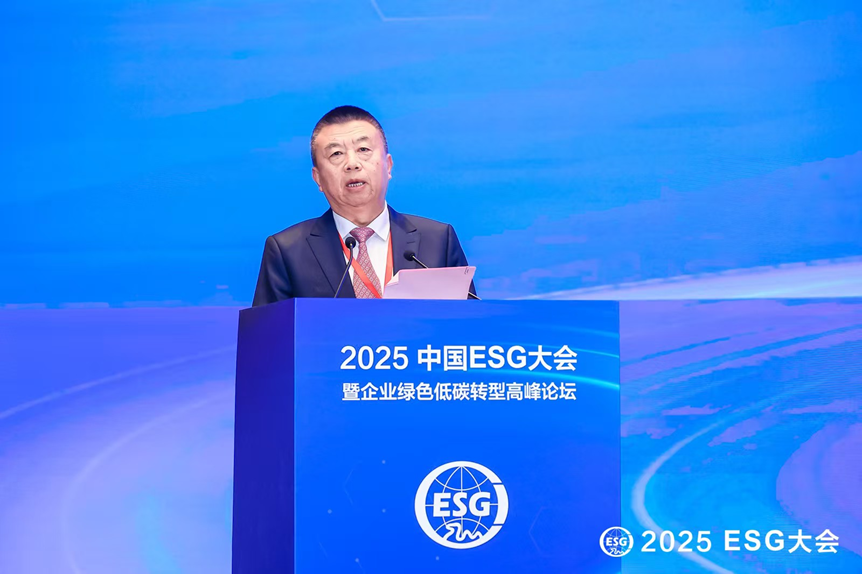
He Zhenwei holds that talent shortage is a prominent bottleneck for ESG’s overseas expansion. ESG empowers economic resilience and also requires the joint efforts of governments, enterprises and research institutions. The better a company’s ESG performance, the stronger its competence to resist overseas risks and the faster its recovery after crises. ESG is not a “tight hoop curse” that restricts enterprises’ overseas expansion, but a “compass” that helps them navigate through difficult cycles.
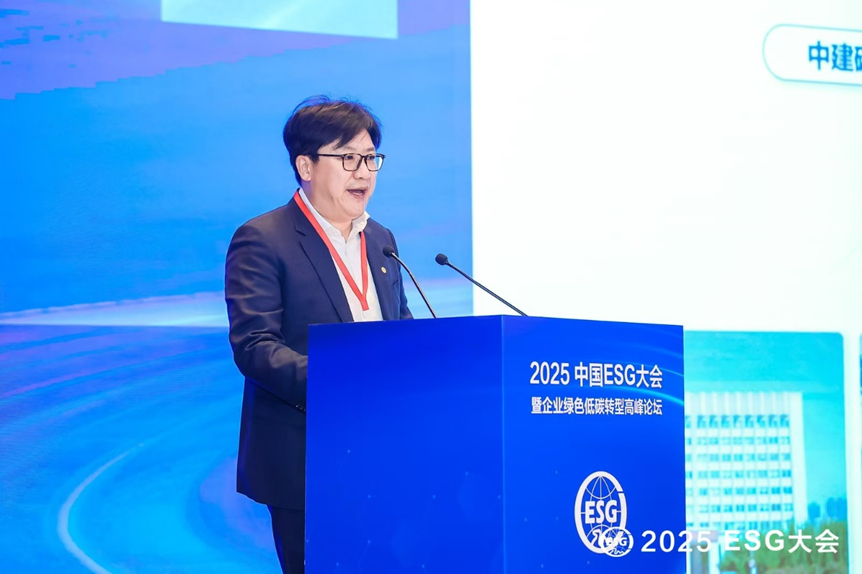
Wang Lianfeng, drawing on the practice of China State Construction Engineering Corporation (CSCEC) stated that in terms of environment, we should rely on technological innovation to promote the harmonious coexistence of humans and nature, and take practical innovation to lead the green and low-carbon transition; in terms of society, we should reshape the supply chain through digitalization to activate synergistic value, and empower people’s livelihood with precise services to consolidate the foundation of governance; in terms of corporate governance, we should take Party building as the guide to improve the governance system, enhance governance efficiency through reform and innovation, and build a solid business defense line with compliance and risk control.

Shen Yu expressed that state-owned enterprises should not only manage their economic performance but also address the long-term social and public welfare considerations in their ESG practices. He actively advocated embracing the digital transformation, pioneering a new sector in “energy + computing power” to empower the digital transformation across industries, promoting the value improvement of data elements, and creating broader opportunities for high-quality social development.
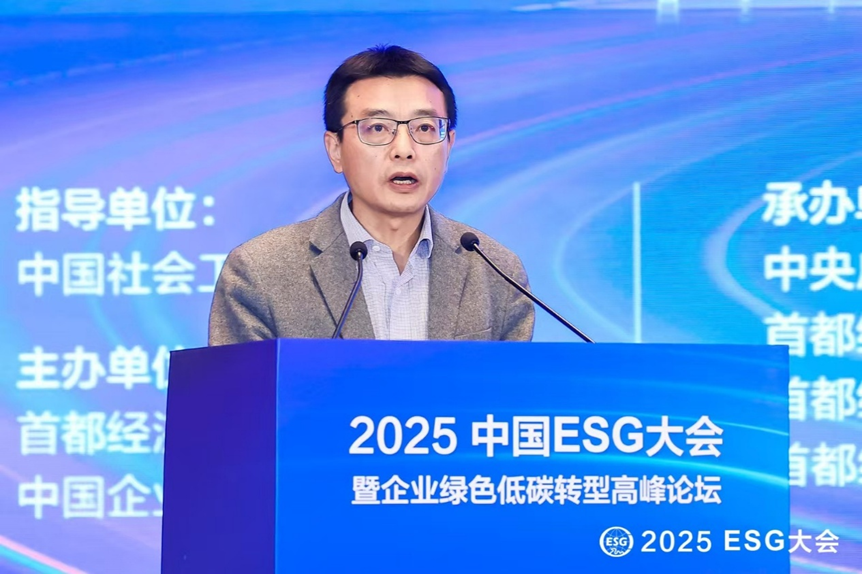
The keynote and thematic speech were hosted by Miao Rong, Secretary-General of the China Enterprise Confederation Green and Low-carbon Development Promotion Committee and Chairman of CEMSF.
Outcomes
The conference’s outcomes release highlighted multiple significant research achievements, providing substantial support for China’s ESG practice. This session was chaired by Mo Lan, Deputy Secretary-General of the China Association of Social Workers.

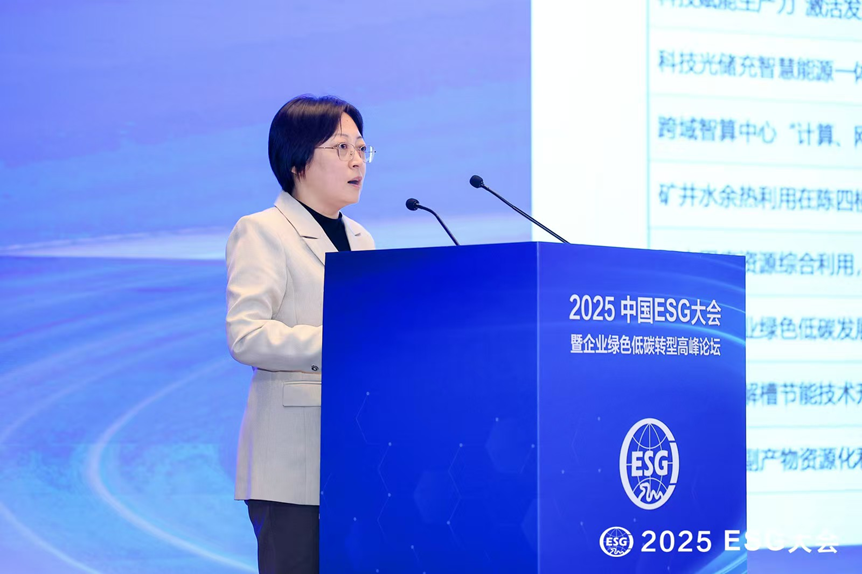
Qu Qingchao Liu Huiyuan
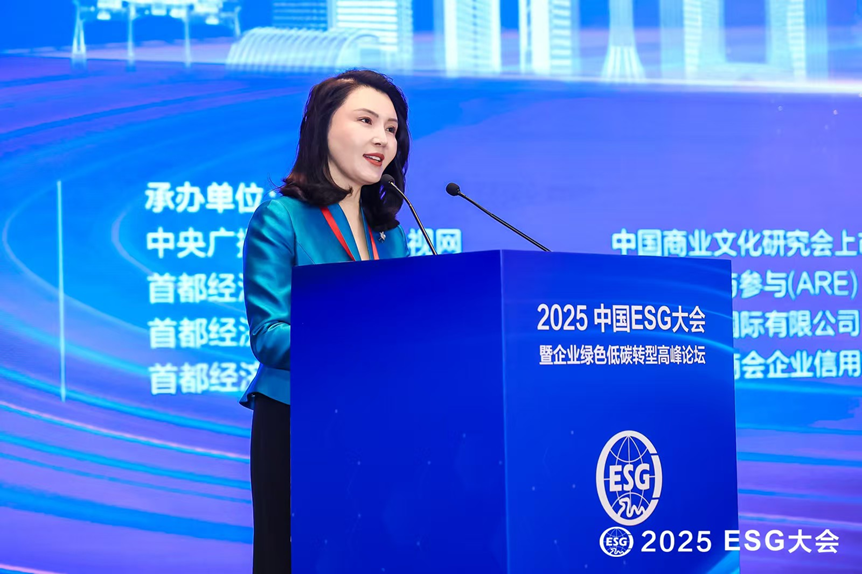
Mo Lan
Qu Qingchao, Member of the 14th National Committee of the CPPCC, Director of the China ESG Research Institute at CUEB, and Co-Dean of the China Market Entity Research Institute, released the 2025 Urban Research Report on High-Quality Development of Business Entities . The report evaluated 337 cities at or above the prefecture level nationwide based on the “High-Quality Development Evaluation System for Business Entities,” which included five primary indicators and 21 secondary indicators. Key findings are as follows: cities were clearly stratified in tiers, competition had entered a new phase of “quality improvement,” with the six first-tier cities remaining consistent with that in the last year; spatially, the report showed a pattern of “eastern leadership, central catch-up, and western and northeastern single-core driving,” with the Yangtze River Delta further strengthening its leading role; Shanghai, Beijing, and Shenzhen were quality benchmark cities, with their “pioneer” roles becoming increasingly prominent; innovation-driven development remains a common weakness for most cities. Qu suggested that improving the quality of urban business entities should be future-oriented, actively embracing the digital era, and shifting urban economic governance from “experience-based decision-making” to “data-driven and intelligent management.”
Liu Huiyuan, Secretary-General of CEMSF and Deputy Secretary-General of the China Enterprise Confederation Green and Low-carbon Development Promotion Committee, released the list of “Outstanding Practice Cases of Green and Low-Carbon Development in Enterprises”. 272 selected cases reflected the latest successful practices of various types of Chinese enterprises in carbon emission control and energy conservation, green manufacturing, new energy development and construction, innovation and promotion of green and low-carbon technologies, resource recycling, and the construction of a “dual carbon” compliance service system. These cases demonstrated the phased achievements made by Chinese enterprises in exploring green and low-carbon transformation paths and achieving high-quality sustainable development.
Parallel Sub-forum
In the afternoon, three parallel sub-forums were held with the conference simultaneously, making in-depth discussions on key topics including sustainable development of listed companies, ESG investment, and ESG empowering industrial development.
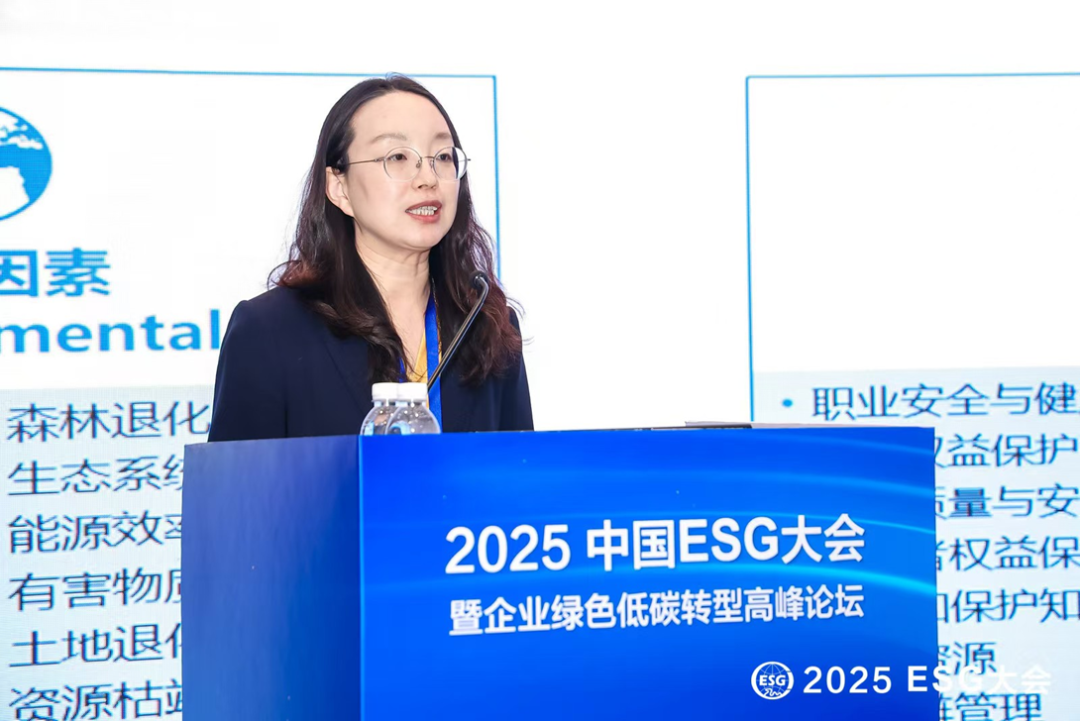
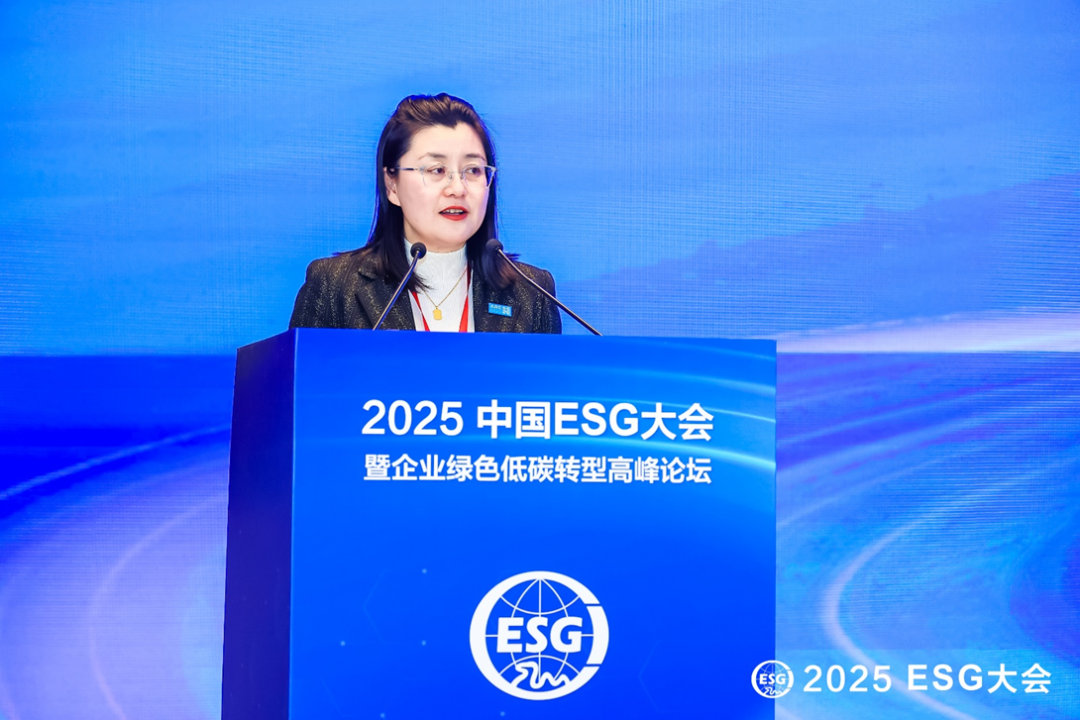
Zhang Han Wu Furong


Wang Kai Wang Dadi
Sub-forum One themed “Sustainable Development of Listed Companies”, was hosted by Mo Lan. Focusing on core issues like ESG governance upgrades, carbon neutrality pathways, and information disclosure, representatives of listed companies, experts, and scholars all agreed that deeply integrating ESG into corporate strategy and daily operations was the key to reshaping the logic of enterprises’ long-term growth and enhancing their value creation capabilities. The forum also conducted in-depth exchanges on issues such as compliance challenges and localized operations faced by Chinese enterprises going global, sharing practical experiences in enhancing international competitiveness and building supply chain resilience through implementing ESG principles.
At this sub-forum, Zhang Han, Deputy Dean of the China ESG Research Institute and Deputy Dean of the College of Business Administration at CUEB, delivered a speech titled “ESG and Corporate Value Creation”. She systematically explained the value evolution logic of ESG from “passive compliance” to “active transformation”, pointing out that ESG has become a “moat” for enterprises to navigate cycles and achieve long-term growth. She emphasized that companies should abandon the traditional perception of ESG as an additional responsibility and transform it into a competitive advantage by deeply integrating it with business operations and establishing a systematic management system.
Sub-forum Two themed “ESG Investment-Green Finance Empowers Industrial Sustainable Development,” was chaired by Wu Furong, Deputy Director of the China ESG Research Institute at CUEB and Director of ARE China Affairs. Representatives from financial institutions and experts made in-depth discussions on green financial product innovation, the construction of ESG investment and research systems, as well as the opportunities and challenges of financial support for the transformation of high-carbon industries.
Wang Kai, Deputy Dean of the China ESG Research Institute and Deputy Dean of the College of Business Administration at CUEB, delivered a speech on “ESG Investment under the ‘Dual Carbon’ Goals”. He analyzed the current challenges faced by ESG investment in terms of policy, ratings, product distribution, and investor awareness, and proposed prospects for future development. He called for improving policy coordination, strengthening the supervision of rating agencies, enriching investment product categories, and raising investor awareness to build a healthy and sustainable ESG investment ecosystem.
Additionally, Wang Dadi, Director of the Theory Research Center at the China ESG Institute of CUEB, participated in the roundtable dialogue on “The Advancement of ESG practices in Listed Companies and New Opportunities for Sustainable Investment,” making in-depth exchanges with other guests.
Sub-forum Three themed “ESG Empowering Industrial Development”, was chaired by Tao Chuanjin, Professor from the School of Social Development and Public Policy at Beijing Normal University. The forum engaged in constructive discussions on how ESG can specifically empower industrial development and support enterprises in global expansion, providing valuable references for ESG practices within industries.

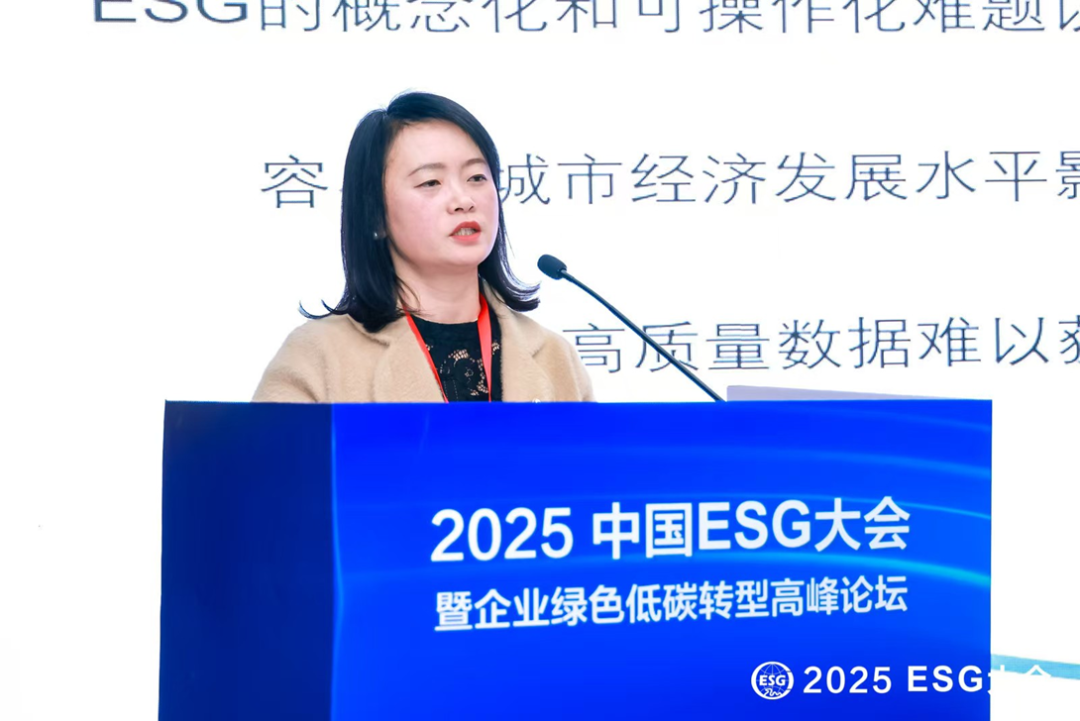
Sun Zhongjuan Pan Na
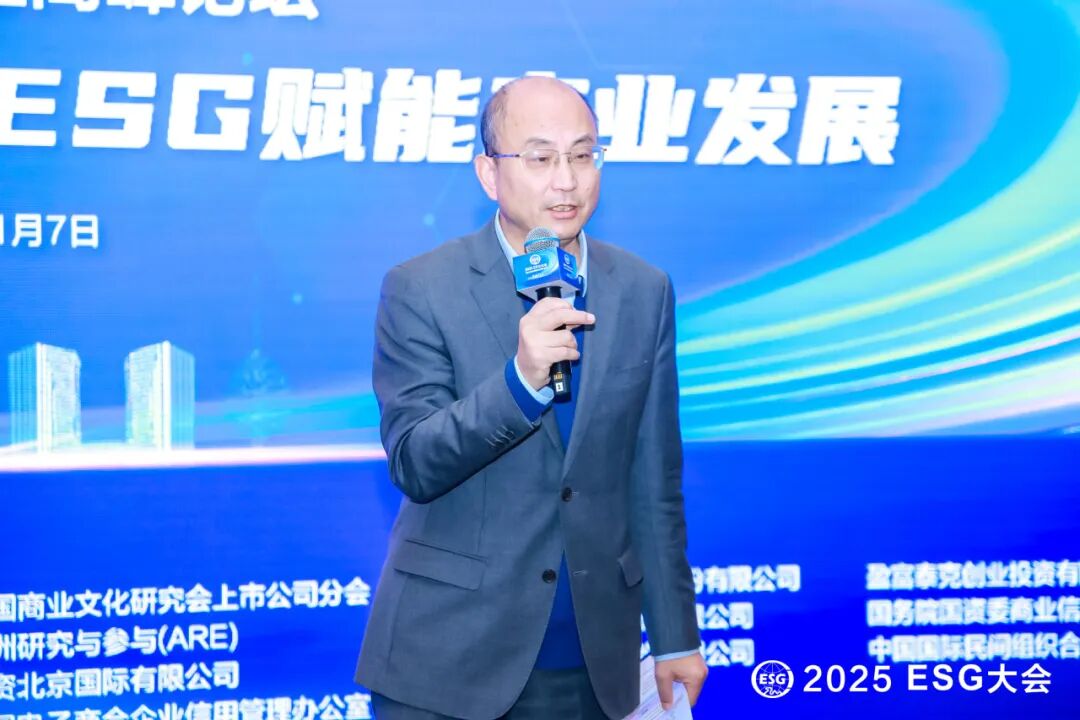
Tao Chuanjin
Sun Zhongjuan, Executive Director of the China ESG Institute at CUEB, delivered a report titled “Research on ESG Standards Empowering Industrial Sustainable Development.” She shared the latest research findings on how ESG standards empower industrial innovation through three theoretical mechanisms, including enhancing the resilience of industrial chains, optimizing industrial structures, and stimulating industrial innovation potential. Empirical studies have also demonstrated the positive impact of parent companies’ ESG disclosure, ISO14001 certifications, and other factors on improving the performance of overseas subsidiaries and the quality of corporate innovation.
At this sub-forum, Pan Na, Researcher of the Evaluation Center of China ESG Institute at CUEB, released the China Urban Sustainable Development Capability Analysis Report on behalf of the institute. The report established an evaluation system covering three first-level indicators, nine second-level indicators and 51 third-level indicators, and systematically evaluated 296 cities across the country. The report found that the ESG capabilities of Chinese cities spatially showed the distribution characteristics of “southern cities being generally superior to northern cities, with eastern regions playing a prominent leading role”, and provided guidance for cities to improve their sustainable development capabilities.
Before the official opening of the conference, the participating representatives visited representative enterprises in Beijing Economic and Technological Development Zone, including Xiaomi Auto Factory, Goldwind Technology Carbon Neutrality Smart Park, and Schneider Electric Beijing Park, conducting on-site research on advanced practices of the ESG and green low-carbon transformation. During the conference, the China ESG Research Institute of CUEB held in-depth exchanges with participating experts on matters such as ESG standards development. On April 18, 2024, the Secretariat of the National Standardization Administration of China approved the establishment of ESG Standardization Project Research Group, with Liu Xuexin, Dean of the China ESG Institute of CUEB, serving as the convener. Currently, the research group is conducting studies in accordance with the established goals, focusing on six research tasks, including standardization needs, development strategies, and paths in ESG. In the future, a series of meetings shall be held to release the research findings on ESG standardization to the public.
This conference was jointly organized by CCTV.com of China Media Group, China ESG Research Institute of CUEB, College of Business Administration of CUEB, School of Economics of CUEB, Listed Company Branch of China Business Culture Research Association, Asia Research and Participation (ARE), Investment Beijing International Co., Ltd., and the Enterprise Credit Management Office of China Electronics Chamber of Commerce. It received strong support from First Capital Securities Co., Ltd., Bank of Beijing Co., Ltd., BOB-CARDIF Life Insurance Co. Ltd., and Infotech Ventures Co., Ltd., the Commercial Credit Center of the State-owned Assets Supervision and Administration Commission of the State Council, and the China Association for NGO Cooperation, as well as media supports from Securities Times, China Times, Sina Finance, National Business Daily, and China Government Procurement News. The successful hosting of the conference has established a high-level, wide-ranging, and deeply influential ESG exchange and cooperation platform for government, industry, academia, research, and society, contributing wisdom and strength to the development of China’s ESG ecosystem and high-quality economic growth.
HOT NEWS
- 1 School of Foreign Studies Hosts Symposium on Embodied-Cognitive Transl...
- 2 School of Foreign Studies Hosts Symposium on Embodied-Cognitive Transl...
- 3 2025 ESG Summit & Green Transition Forum Held in Beijing: Empowering E...
- CUEB Signs Letter of Intent with University of Alberta
- 2025 Overseas Universities International Education Fair: CUEB Special ...
